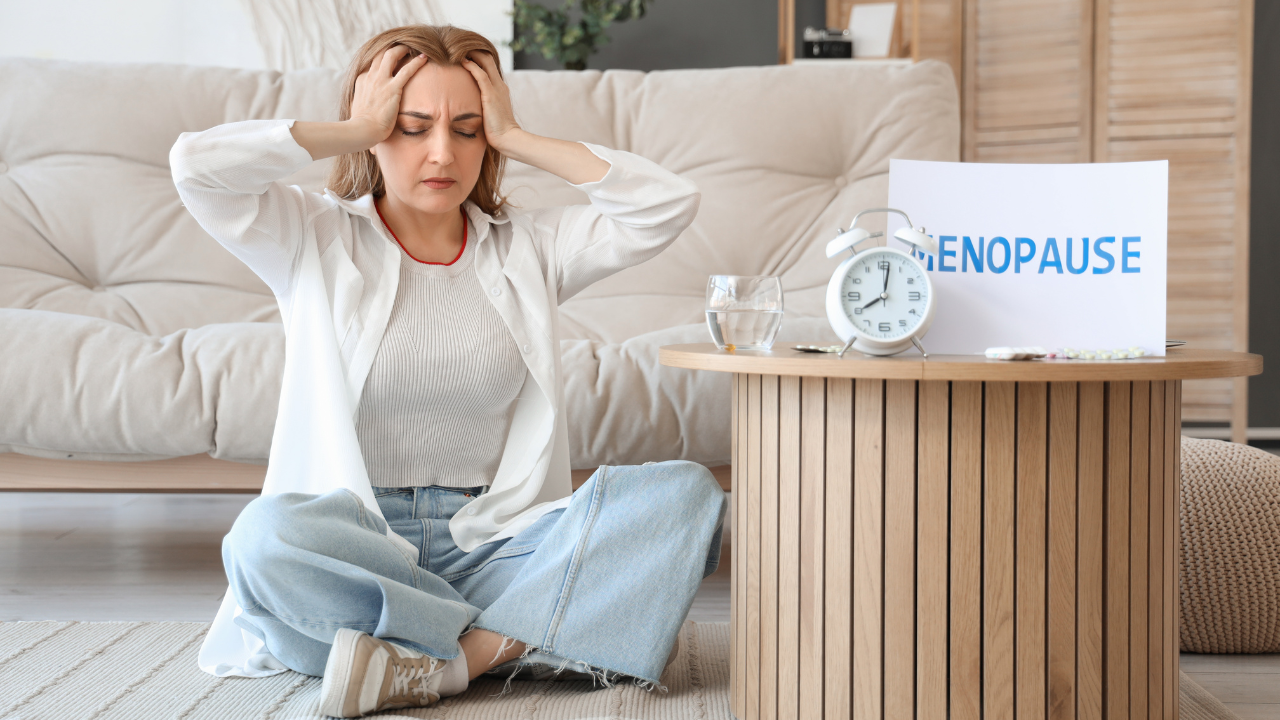Link Between Hormones and Mood during Perimenopause/ Menopause
Feb 09, 2025
Menopause and perimenopause mark a significant transition in a woman’s life, often bringing about physical, emotional, and mental changes. While hot flashes and irregular periods are well-known symptoms, many women also experience mood swings, increased anxiety, and even depressive feelings. Understanding the hormonal shifts that occur during this time can provide insight into these emotional changes and help women navigate them with greater ease.
Hormonal Changes in Perimenopause and Menopause
The two primary female sex hormones, estrogen and progesterone, fluctuate dramatically during perimenopause and eventually decline during menopause. These changes influence neurotransmitters in the brain, particularly serotonin and dopamine, which regulate mood and emotions.
- Estrogen: Plays a crucial role in serotonin production, the neurotransmitter responsible for feelings of happiness and emotional stability. As estrogen levels drop, serotonin production decreases, potentially leading to mood swings, irritability, and depressive symptoms.
- Progesterone: Known for its calming effects, progesterone promotes relaxation and sleep by interacting with gamma-aminobutyric acid (GABA), a neurotransmitter that soothes the nervous system. Lower progesterone levels can contribute to increased anxiety, restlessness, and difficulty sleeping.
Cortisol and Stress Response
During perimenopause and menopause, cortisol, the body's primary stress hormone, often becomes dysregulated due to hormonal fluctuations. This can heighten stress sensitivity, making women feel more emotionally overwhelmed than usual. Chronic stress further depletes serotonin and dopamine levels, exacerbating feelings of anxiety and depression.
Testosterone and Motivation
Though commonly associated with men, testosterone plays an essential role in women’s energy, motivation, and libido. As testosterone levels decline with age, some women experience fatigue, loss of motivation, and decreased confidence, which can contribute to a lower mood.
How These Hormonal Changes Contribute to Depressive Feelings
The fluctuations in estrogen and progesterone levels during menopause and perimenopause can significantly impact emotional well-being, making women more sensitive to stressors that they previously managed with ease. Sleep disturbances caused by lower progesterone levels further exacerbate mood instability and fatigue, increasing the risk of depression. The decline in estrogen also leads to reduced serotonin and dopamine production, which are neurotransmitters crucial for maintaining a stable and positive mood. Additionally, physical changes such as weight gain, loss of muscle tone, and skin alterations can negatively affect self-esteem, contributing to feelings of sadness and self-doubt. The decline in estrogen’s anti-inflammatory properties can also lead to increased systemic inflammation, which has been linked to mood disorders, including depression. These combined effects create a perfect storm for depressive symptoms, making it crucial to address hormonal imbalances with lifestyle and medical interventions.
Strategies to Support Emotional Well-Being
- Prioritize Brain-Healthy Nutrition
Increase omega-3 fatty acids (found in fish, walnuts, and flaxseeds) to support brain function and mood.
Eat magnesium-rich foods (like leafy greens, nuts, and dark chocolate) to help regulate stress and improve sleep.
Consume protein and complex carbohydrates to stabilize blood sugar and serotonin production.
- Support Hormonal Balance with Movement
Regular exercise improves mood by increasing endorphins and boosting serotonin and dopamine. Resistance training, yoga, and walking can help regulate hormones and reduce stress-related cortisol spikes.
- Optimize Sleep Hygiene
Maintain a consistent sleep schedule.
Limit screen exposure before bed to protect melatonin production.
Create a relaxing bedtime routine with meditation, deep breathing, or herbal teas like chamomile.
- Manage Stress and Support the Nervous System
Breathing Exercises: Deep diaphragmatic breathing helps activate the parasympathetic nervous system and reduce cortisol levels.
Mindfulness and Meditation: Regular practice improves emotional regulation and reduces anxiety.
Vagus Nerve Stimulation: Activities like cold exposure, singing, and humming can help regulate mood and stress responses.
- Consider Natural and Medical Support
Herbal Adaptogens: Ashwagandha, rhodiola, and maca root can support adrenal function and hormonal balance.
Hormone Replacement Therapy (HRT): Some women find relief from symptoms with bioidentical hormone therapy under medical supervision.
Supplements: Vitamin D, B vitamins, and probiotics can support mental and emotional health.
Perimenopause and menopause are natural transitions that, while challenging, can be navigated with the right knowledge and strategies. Understanding how hormonal changes affect mood and mental health allows women to take proactive steps to support their well-being. By nourishing the brain, managing stress, and making lifestyle adjustments, women can maintain emotional resilience and embrace this phase of life with confidence and empowerment.
If you’re experiencing significant depressive symptoms, it’s essential to seek support from a healthcare professional to explore personalized options for managing your emotional health during this transition.
This blog is not meant to diagnose or treat any medical conditions. Instead, it aims to provide an overview and present a new perspective.
This content is not based on a specific research study. It is for informational purposes only and not a substitute for professional medical advice. Always consult your healthcare provider with any health concerns. Please read the full Terms and Conditions here.


